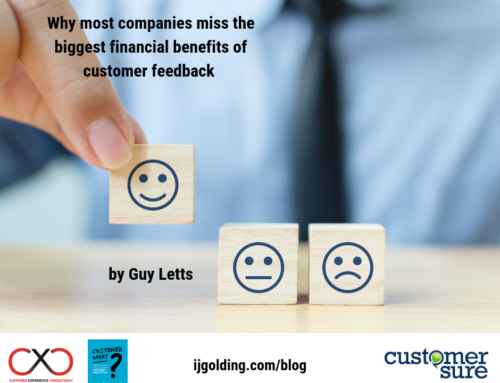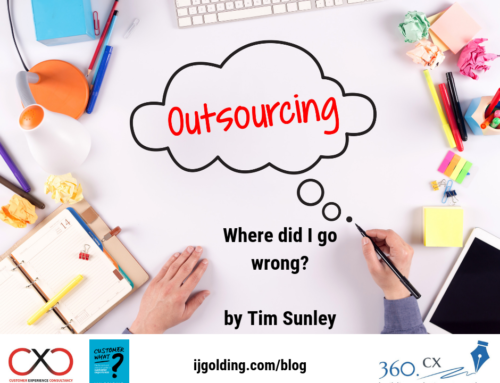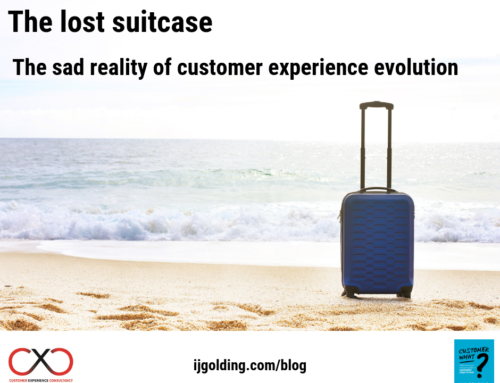October 2014 was not the best day to be a shareholder of two of the world’s retail giants. Tesco continued their unfortunate journey from world domination to public implosion. The company who convinced the UK and beyond that ‘every little helps’ are going to need all the help they can get to fight through their greatest ever crisis. Whilst the plight of Tesco was very visibly reported in the UK, the performance of an even bigger retail juggernaut was less so. On the day that the BBC reported Tesco shares ‘plunging’ by more than 8%, Amazon shares ‘plunged’ by 10%. All is not rosy in the supersize retail world it seems.
As someone who spends every working day influencing organisations to focus on people (customers and employees), I am always intrigued that the reporting of business performance seems to spend more time empathising with shareholders than it does with customers and employees. Do not get me wrong – I obviously recognise that the financial performance of any business will determine its very existence – declining financial performance is big news, especially if the decline is significant. However I think it is important to focus less on the effect on shareholders and more on what is behind the decline in the first place.
Too many businesses worry about Shareholders first, automatically placing concerns for customers and employees lower down the list of priorities. Businesses cannot operate without shareholders and investors – that is true – yet I believe that it is vital for companies to focus on getting things right for customers and employees first so that in turn, shareholders will benefit from the improving financial performance of the business. This is a subtle but very significant reversal of what we see reported in the business pages on a regular basis.
Although both Tesco and Amazon saw their declining financial performance very clearly displayed in the car headlights yesterday, the reasons behind the declines are very very different – in my opinion, the reasons highlight brilliant why their business models/cultures have been so very very different over the last few years.
I wrote about the ‘Bursting of the Tesco bubble’ in July 2014. In my blog post I argued that whilst they publicly claimed that ‘no-one tries harder for their customers’, the reality is that they were trying too hard to please their shareholders. Their obsession with growth led them to taking their eye off the ball of why they really exist and what their customers want. They are now in a situation where the behaviour has led to an almost complete erosion of trust with the very consumer that they believed they were working so hard to please. Perhaps the greatest challenge now facing the new CEO, Dave Lewis, is to be able to stand up to shareholders and allow them to understand why the needs of customers and colleagues must be put back ahead of their own.
Let us look at the contrast with Amazon. A company that has famously been focussed more on growth than profit, there are many similarities with the trajectory that Tesco have taken over the last few years. Still led by their founder, Jeff Bezos, unlike Tesco their entire business model is based on meeting and exceeding customer expectations. Shareholders need to be in it for the long term. Yesterday the BBC reported the following:
Investors have long been wondering when Amazon will turn its significant revenues into profits for shareholders. Amazon has been spending heavily in various new initiatives, including its Amazon Fresh grocery delivery service in the US, and its $1bn acquisition of video game streaming site Twitch.That has hurt profits at the firm, with operating expenses growing to $21.1bn, compared with the $17.1bn last year. Investors have been tolerant of Amazon’s policy of reinvesting profits back into the firm. But patience has been wearing thin in recent months. Shares in the firm have fallen nearly 20% since the beginning of this year.
Unhappy, restless shareholders whose patience is wearing thin. The response of many large corporations would be to immediately address their concerns and do whatever it takes to deliver them a return in the short term. That may be the response from many, but not from Amazon and Mr Bezos. Rather than pandering to shareholders, Jeff Bezos’s public statement when talking about their financial performance was as follows:
“As we get ready for this upcoming holiday season, we are focused on making the customer experience easier and more stress-free than ever,”
This is why Customer Experience Professionals love Jeff Bezos!! Amazon is about long term relationships – with customers, employees and shareholders. The returns will come in time. In order to sustain and grow a business, Mr Bezos understands that it MUST be done so by delivering a stress free experience that just keeps getting better and better. It is not difficult to understand. Of course the investors and shareholders deserve to receive a healthy return on their investment – I am completely confident that will come (as I am sure Mr Bezos is) – they just need to be patient and recognise that continually focussing on improving the customer experience will secure both the returns and the sustainability of the business for a very long time.
As the dust settles, I am sure that Jeff Bezos is a far more relaxed business leader than Dave Lewis. Businesses need shareholders, but they need customers more. If both organisations can influence their investors to recognise that greater returns come from consistently getting better at giving customers what they want and need, the media will very soon be reporting a very different story.







Another very interesting post Ian. The contrast between these 2 retail goliaths is stark.
Surely though Tesco’s strategy of appearing to put it’s shareholders (owners) first, is what pretty much every business does, small/medium/large in whatever sector!
This is the established wisdom – that the business is there to provide it’s owners an income and lifestyle that they desire.
Most businesses base themselves on this and are constantly reminded that vital signs are cashflow and profit!
Whilst these issues are important, they are simply internally driven measurement tools.
They cannot be the most important things for a business as they are merely results of other things happening!
As Peter Drucker once said – the only profit centre in any business is the customer.
So, recently the CEO of Wetherspoons was complaining about the Corporate Governance rules. His analysis revealed that “Shareholders” were mentioned say 45 times. “Employees” came up around 6 times and “Customers” twice!!
Maybe in this document a “skew” is not surprising, but it seemed to indicate to the CEO that there was a problem. In fact he used this analysis to comment – critically – on Tesco’s management structure.
On smaller businesses – Michael Gerber’s much quoted “E-Myth revisited” on it’s cover suggests that his work answers the question of why most small businesses do not work.
There is much to learn from his analysis, and many have, but the over-riding impression taken from Gerber is that successful business focus comes mainly from getting internal procedures/systems right. His main authority for this is the immense McDonalds empire – which has more employees than any other private sector employer – and of course amazing systems!
Systems can improve performance immeasurably but they are only useful if the business has a product/service that consumers want! After all we don’t go to McDonalds in our millions world-wide to buy/admire their systems!
The proof of the fascination that we all have with our own businesses is that most of us still sell ourselves on the features that we bring. Most marketing is features-driven.
Modern thinkers advise that customers are not interested in “what we do” ie “our features” but rather “what it is we stand for”, and particularly “what we cause”!
So – what benefits do we bring to the customer and what problems do we solve for them.
Nobody wants an electric drill, what we really want is the hole that the drill causes,
As you say Ian,Tesco has a lot of thinking to do. But please can they realise it’s not all about price!
Many thanks as always for sharing such interesting and insightful thoughts Adrian. I do agree with you – something has to change in corporate behaviour – the question is when?!
Very interesting article Ian!
It’s interesting to see that Amazon spent large amounts of money to improve their customer experience and eventually move forward and keep on innovating. By worrying too much about shareholders, Tesco is risking to fall behind and eventually loose its edge.
Amazon’s investors’ patience might be running thin but Bezos appears to be much more confident about the company’s future. Amazon and Tesco are a perfect example of the difference between “claiming to be customer centric” and actually “being customer centric”.
Amazon is testing so many new interesting ideas. They might not all work but they surely secured their spot as leader in their industry. That’s what will help them thrive in the end.
Agreed Aurelie – Jeff Bezos is a customer centric leadership phenomenon. I often say that if only Amazon sold houses…..:) Many thanks for taking the time to comment.
Good post Ian. Two thoughts:
1) Tesco are playing to where the puck is. Amazon is playing to where the puck will be (to borrow one of Wayne Gretzky’s analogies). This requires brave and bold leadership who are not easily swayed by shareholders demanding short-term returns on their capital.
2) HBR have run a number of articles recently on CEO compensation, shareholder greed and how this leads to short-termism, manipulation of share price and even fraud.For example a CEO can hype expectations to raise the price of a stock, miss expectations to cause a price drop, secure a tasty share options package at the new low price and then restore the share price by hitting new expectations. (See Roger Martin’s the The Rise and Likely Fall of the Talent Economy).
Again the overall point is businesses need to play for the long-term result and that comes by focussing on the needs of your current customers, your competitors customers and the customers that aren’t even in your market.
Many thanks for taking the time to read and respond David – I completely agree with you. I am no sure how many stories we will need to read like the Tesco one before organisations behaving in the same way get the message!
[…] Tesco […]